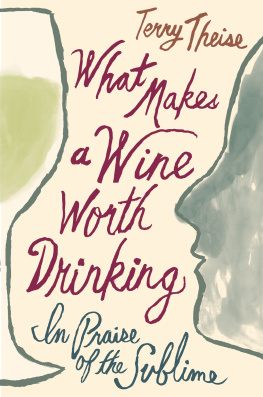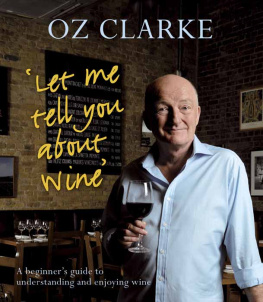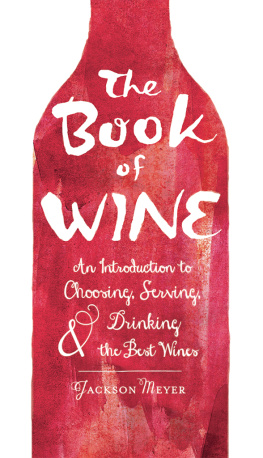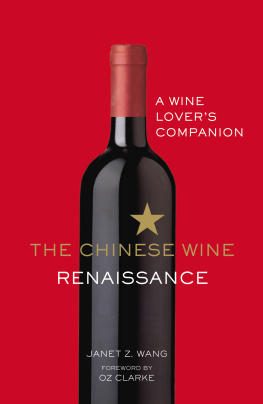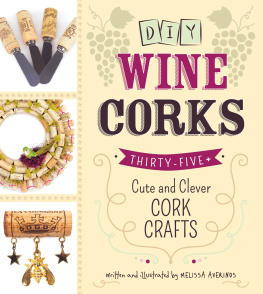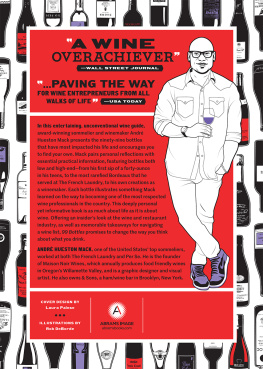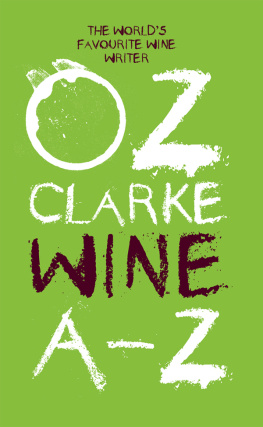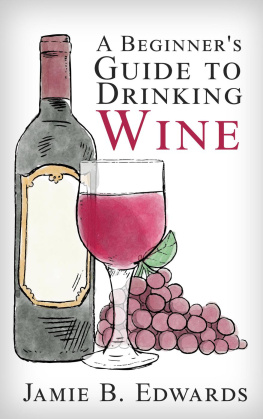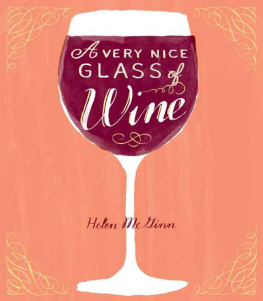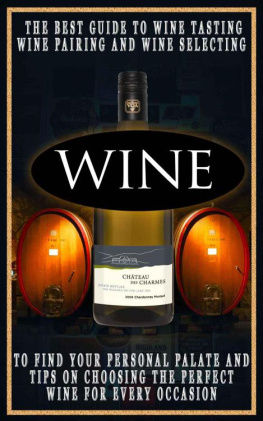Copyright 2018 by Terry Theise
All rights reserved
For information about permission to reproduce selections from this book, write to or to Permissions, Houghton Mifflin Harcourt Publishing Company, 3 Park Avenue, 19th Floor, New York, New York 10016.
hmhco.com
Library of Congress Cataloging-in-Publication Data
Names: Theise, Terry, 1953 author.
Title: What makes a wine worth drinking : in praise of the sublime / Terry Theise.
Description: Boston : Houghton Mifflin Harcourt, 2018. | Includes bibliographical references.
Identifiers: LCCN 2018012317 (print) | LCCN 2018014722 (ebook) | ISBN 9781328761958 (ebook) | ISBN 9781328762214 (hardcover)
Subjects: LCSH: Wine and winemaking.
Classification: LCC TP548 (ebook) | LCC TP548.T49 2018 (print) | DDC 641.2/2dc23
LC record available at https://lccn.loc.gov/2018012317
Book design by Allison Chi
Jacket design and illustration by Christopher Moisan
Author photograph Anna Stcher
Some material was originally published in slightly different form in the magazine World of Fine Wine.
v1.1018
The pleasure of seeing into the life of things is one of the least celebrated and most important of the panoply of satisfactions.
Rebecca Solnit
Introduction
We are set down on this earth bewildered. Myself right now, I am completely bewildered. Someone asked me once why I write and I replied, Because I cannot speak and cry at the same time.
Tom Spanbauer
I buy produce at the same farmers market each week. Ive gotten to know the farmers, so that when I eat a meal its not just tomatoes or even heirloom tomatoes, its Helens tomatoes or Jeffs eggplants or Kathys thyme. And because the growers know me, too, I like to imagine that from time to time they think of me when they pick an especially sweet ear of corn or plum tomato: Terry will like this.
In much the same way, I have been fortunate enough to develop strong relationships with some very talented vintners. And when I taste their wines, I cant help but think of them, and of their vineyards.
The best wines are infused with the spirits of the people and places that produced them. This is a simple truth that I was lucky enough to learn very early in my wine-drinking life. The growers I met during my earliest days of becoming seriously interested in wine showed me the wines they had made, told me about the soils their wines were grown in, poured samples for me, and encouraged me to explore the vineyards. Often they came along. (A few of them must surely have wondered how a young man who looked more at home behind a drum kit than in a tasting room had ever darkened their doors. Years of fussing from many people in my life had never convinced me to cut my [very long] hair, but after that first trip to visit growers, I had to; I didnt want to freak them out.)
Wine was presented as a being with a life equivalent to mine, not as a thing to be examined and judged. Of course I had preferences, but I never felt superior to wine. It came from grapes that grew in living soil. It was made by living people who tilled their land as gardeners till their gardens, with attention and respect and concern. Wine was a citizen of eternity, just as I was, and as we all are.
My relationship with wine was a conversation between two living beings. This was imprinted on me from the start, and has become my paradigm, my template for being with wine. It isnt a hobby, it isnt something I look upon from a place of removeits telling, I think, the popular publications title, Wine Spectator. It is rather a companion, has always acted companionably, and has never let me down.
My phrase living being can muddy the waters, I know. Wine isnt sentient. But it is biologically alive and chemically active, and when it is anchored to its place of origin and to its producers intimacy with those places, I find it has a self. It possesses an existential reality that makes it more than merely a thing. The same can be claimed by cheesemakers and even by potters, Im sure you would agree. A beautifully made work of pottery is both an object and an expression of the hands, eyes, and soul of the person who formed it.
If we see the world sacramentally (in Anne Lamotts coinage), then we live among a host of beings aglow with life force. If we see the world materially, we live in a kind of poverty.
Any authentic wine can glow with this life force. What makes a wine authentic? Ill tell you. It cant be a consumer good and it cant be made industrially, because then it really is a thing thats just like every other thing by which consumers are induced. Authentic wine is connected to place and family, whatever that may entail. It is not formed to appeal to a market.
If we see wine as a being and not a thing or an item or a product, that view changes everything. The drinking of wine becomes a dance of equal beings instead of the consumption of an entertainment. I find that the question of authenticity is the first principle; it comes before I taste and judge whether I like a wine and how much. If a wine is inauthentic, Id rather not know it at all. Its a guy I dont wanna hang out with.
I also consider, why this particular friend? What makes him a good companion? Concomitantly, what would make him an annoying one? My friends are selected to the extent they please me, before I step back to contemplate and respect their more serious attributes. And so the basic question: by what am I pleased or displeased? I have learned I prefer friends who are easy to be with. They arent always my most fascinating friends, but sometimes I prefer ease and solace to fascination. There are wines that show an unseemly assertiveness, as if they are afraid I wont hear them. I hear them just fineI simply dont like them. (I have rather an uneasy friendship with so-called natural wines; sometimes I love them and other times I want to cringe. They make exceptionally scintillating conversation, but they forgot to apply deodorant. If we arrive at a place where flaws and unpleasantness are proof of authenticity, we are letting ourselves be abused. More on this later.)
If I am in a relationship with wine, I must consider whom I bring to the dynamic. I must think about myself. At the same time I must engage with the wine as a fellow being, but a separate being. It (or he in many European languages) is not me. What do I see through my windows? What is actually there? And what is the most useful and telling way to describe this? Seeing wine as a beingor as a friendasks us to think about the question of objectivity. After all, were not objective about our friends, even if we can enumerate their virtues. We may well admire them, but were friends because we like them. We have a dual vision. We examine our own filters and assumptions and are compelled to examine why we like the wines we like. Where are the lines between subjective and objective? Are there lines at all? If we indeed possess dual vision, what do we see out of each eye?
I will try to tell you.
If I am in a relationship with wine, it stands to reason this will change as I myself change. Getting older entails a reordering of ones position on mortality, which is to say, it becomes real. Our very voices change. The things we talk about are different now. My relationship to beauty becomes more crucial, as many things do. Wine is a being of beauty, addressing parts of me that werent there before. This needs to be understood, but first it must be acknowledged and described.
Finally, if wine is indeed a fellow being, it can never be an object I place into a box to pull back out when I want to play with it. It is an inextricable part of my life, and even more: it is an inextricable part of life. As I go about my days, even when Im not thinking of wine, it is present. Its a free-range sort of friend; it touches what it pleases and lets itself be touched back. It orbits my other concerns and is orbited by them. It makes me think of other things, and other things make me think about wine. There is no separation between this and that. I will say what its like to live this way, especially but not exclusively when Im on tasting trips to select for my professional portfolio. Life, it turns out, is wonderfully rich and strange and lovely.

